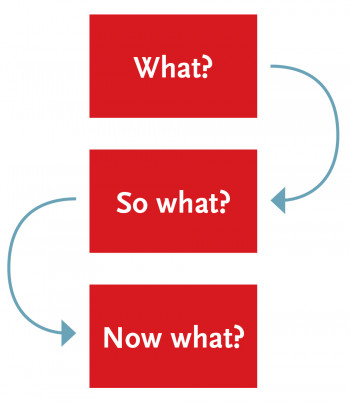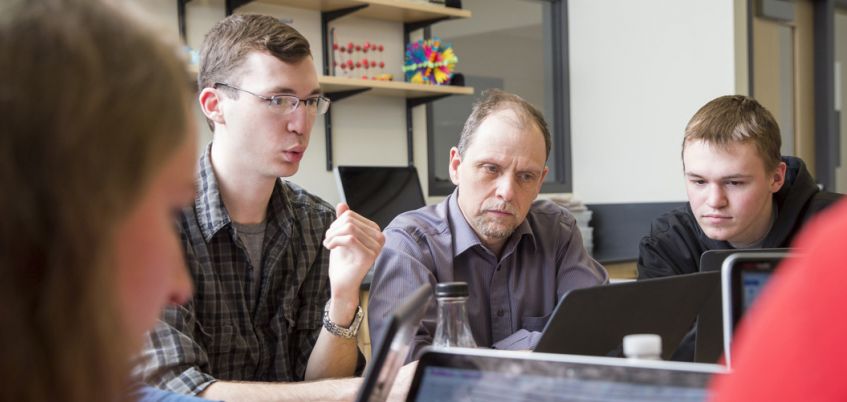Reflection Toolkit: Turning Knowledge into Meaning
Whether you are looking for an introduction to reflective practice, tips for facilitating reflection, or tools for your classroom, we invite you to explore our resources to help make what you teach as meaningful as possible for your students.
“To read without reflecting is like eating without digesting.” — Edmund Burke
Vocation & Reflection
Vocation is about building a whole life. Our education is to help us discover what our gifts are and to use those gifts for the sake of our neighbors so that all may flourish. Reflection is one of the tools to help you discern your vocation throughout your life. As you become attentive to serving your neighbor, in your workplace, family, faith community, and civic organizations, your life becomes fuller.
Carthage is about equipping you to better serve your neighbors in those environments. The more powerfully skilled and effective you are, the more useful you become to each community you choose to serve. Wherever you go, wherever you “plant” yourself, if you bloom there and serve those around you well, you will not only find professional success, but a meaningful and purposeful life.
Strategies for Facilitating Reflection
Why Reflection?
What is reflection?
Reflection is a process where students describe their learning, how it changed, and how it might relate to future learning experiences. (“Learning and Leading with Habits of Mind,” 2008)

Why is it important?
Reflection is a skill that often goes undervalued in classrooms that are packed with content. However, reflection is an important practice for students to make sense of and grow from a learning experience, and it is a practice backed by scholarship (see List of Scholarship below). A 2014 study by Harvard also confirmed that reflecting on one’s work improves job performance. Although often situated in the humanities and social sciences, reflection is an important practice across academic disciplines including nursing, business, the sciences, and more (see WAC Clearinghouse for a list of disciplinary reflection articles). As a result, reflective writing is one great method for students to reflect on their learning experiences in the English 106/108 classroom. Students, therefore, should be exposed to continuous reflective writing practices so that they become “producers” and not “consumers” of knowledge (Costa and Kallick, 2008).
How do I do it?
Reflection is often most effective in small bites. You can embed short opportunities for reflection into assignments, class discussions, assessments, or following any of these activities as a way to support and reinforce their learning. This website offers tools you can select from to suit your own classes.
Training & Resources
You can find information about upcoming events and trainings on our News and Events page.
Can I attend a live training session with people who have more experience incorporating reflection into their teaching than I do?
Yes! The Teaching Commons holds regular training sessions that you can attend. The schedule will be available soon!
I would rather just read the literature. What should I read?
- References and resources Bowers, S. (2015). Bowers Reflective Model. The Journal of New Writing in Health and Social Care, 1(2), 31-37.
- Clemson.edu. (N.D.). Reflection Activities, retrieved from Reflection Activities r.pdf (clemson.edu)
- Georgetown University. (N.D.). Reflection in the Classroom, retrieved from Reflection in the Classroom - cndls website (georgetown.edu)
- Harvard Business School. (2014). Reflecting on Work Improves Job Performance, retrieved from Reflecting on Work Improves Job Performance - HBS Working Knowledge
- Purdue University. (2021). The Purpose of Reflection, retrieved from The Purpose of Reflection // Purdue College of Liberal Arts
- Sloan, D. (N.D.). Reflection Activities, retrieved from Microsoft Word - _.8_ Reflection Activities FINAL.doc (usf.edu)
- Teachwriting.org. (2017). 10 Unique and Creative Reflection Techniques & Lessons for the Secondary Student, retrieved from 10 Unique and Creative Reflection Techniques & Lessons for the Secondary Student — TeachWriting.org
- University of Mississippi Rhet Lab. (N.D.). What is Reflection? retrieved from What is Reflective Thinking? | UM RhetLab (lumenlearning.com)
- Wain, A. (2017). Learning Through Reflection. British Journal of Midwifery, 25(10), 662-666. Also available at (PDF) Learning through reflection (researchgate.net)
- Whenam, T. (2020). 15 Ways to Spark Reflection in your College Classroom, retrieved from 15 ways to spark student reflection in your college classroom (nureva.com)

